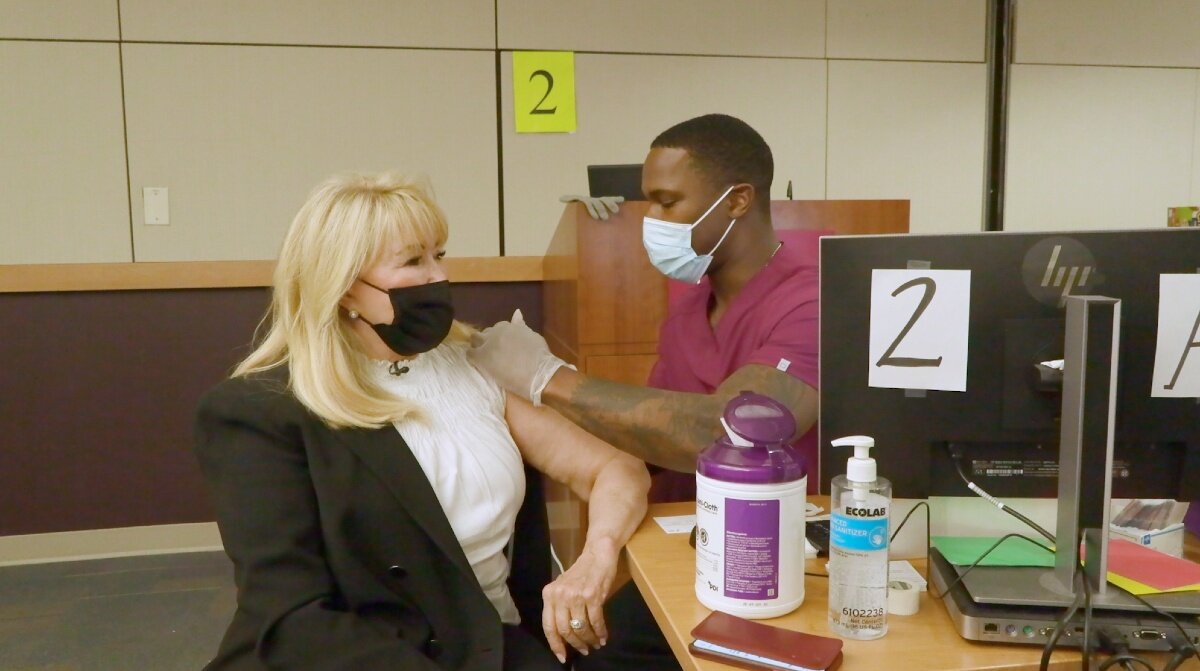Surviving COVID twice: A Denver woman goes 2 rounds with the disease

DENVER — Finding out you have COVID-19 would be a nightmare for anyone. Cindy Schulz of Denver faced that nightmare twice. And her second fight with the disease put her in the hospital."We're really fortunate that my wife is here," said Steve Schulz, her husband.By all accounts, confirmed cases of people who fully recover from COVID and then get infected a second time are rare. But there have been reports across the globe about people like Cindy Schulz who have faced a rematch with a disease that has killed 3.1 million people worldwide.For her, Round 1 came in March 2020, just as the virus was making itself known in the United States.She said she already had been grappling with various medical conditions, including chronic obstructive pulmonary disease, recurring bronchitis and Type 2 diabetes. Since her viral symptoms were relatively mild, she stayed home."I felt fortunate that I had the (COVID) antibodies, but we were still extremely cautious," she told Rocky Mountain PBS. At the time, a COVID vaccine was not yet available.Then, COVID struck Cindy Schulz again in late 2020. With a high fever and low blood oxygen, she spent several days at University of Colorado Hospital at Aurora's Anschutz Medical Campus. There she was given supplemental oxygen but did not have to be put on ventilation.
Her husband also was infected late last year but said he "barely knew he had it." The way the disease lays some people low and barely touches others is like "COVID roulette," he said.Dr. Sarah Jolley of UCHealth, who was Cindy Schulz's COVID outpatient rehabilitation doctor, called hers a "pretty unique case. One, [to] have reinfection with COVID, and then also to have reinfection that results in being as sick as Cindy was the second time around and needing to go to the hospital and requiring a fair bit of oxygen for her COVID infection."Added Jolley: "When she had presented [with COVID] back in the spring [of 2020], it was more outpatient [treatment], like the more typical viral infection. But when she came back, I mean, she was pretty sick."

Cindy Schulz said she only now feels like she's recovering. And after back-to-back bouts with the disease, she decided to do what she could to ward off any potential Round 3.
On April 23, she got her first of two vaccine doses — a shot that made her "pretty emotional, but very excited. It's really overwhelming." And then she closed in for a tearful hug with her husband.
With her vaccination, finally, "the journey could be over," she said. (Experts advise that even people who've been sick with COVID should get vaccinated.)After watching his wife struggle twice with COVID, Steve Schulz has a message for anyone reluctant to get vaccinated.COVID is "very real, and it's frustrating to both of us to listen to people who discount the vaccines [and] discount the virus itself," he said. "There's always going to be naysayers, but I think they're doing a great deal of damage to people."
'Rare but on the rise'
Early on in the COVID pandemic, there was hope that anyone who recovered from the disease would acquire long-term protection from getting sick again.
But a National Institutes of Health report in January said that "scattered reports of reinfection" with SARS-CoV-2, the coronavirus type that causes COVID, "have raised concerns that the immune response to the virus might not be durable."
For example, researchers at the Yale University School of Medicine reported in February on a patient who recovered from a severe case of COVID, then had several negative tests, but four months later was reinfected and tested positive for coronavirus-related "severe acute respiratory syndrome."
COVID reinfection cases "are still rare but on the rise," the journal Science reports. BNO News, a Netherlands-based news agency, maintains a global "COVID-19 reinfection tracker" that to date has tallied 70 confirmed reinfections around the world, and more than 37,000 "suspected" reinfections.
Either of those numbers is a tiny fraction of the roughly 150 million COVID cases worldwide so far. But according to Science, experts believe the number of reinfections may in fact be much higher, partly because — as one scientist put it — "the bar is very high" to prove that a given patient has been infected a second time.
Still, evidence so far suggests that those who get sick with COVID have a high degree of protection from a second case, at least for a period of several months after recovery.
In a study of about 200 people exposed to the virus, some as long as eight months earlier, researchers at the La Jolla (California) Institute for Immunology found that 95% of those studied retained "durable immune responses" to the disease.
But whether COVID immunity weakens over time, and whether COVID vaccines eventually lose their punch and need to be boosted, are questions that have yet to be answered.
This story is part of The Long Haul, an ongoing Rocky Mountain PBS series focused on personal stories from Colorado communities about the long-term impacts of the COVID-19 pandemic.
